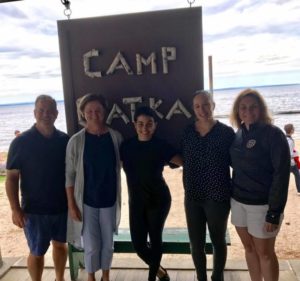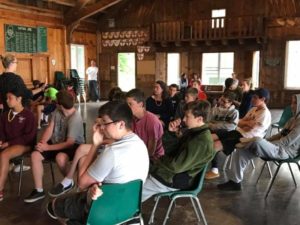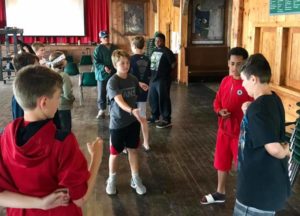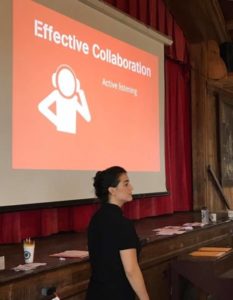Campers and Global Citizenship: Helping Kids Understand Differences and Division
High Resolves, a nonprofit educational organization founded in Australia, wants kids to know that they are global citizens belonging to a single human race. Differences are inevitable it doesn’t mean divisions are.

Camp O-AT-KA Hosts Two Representatives from High Resolves
Two representatives from High Resolves traveled last Thursday to Sebago’s boys’ Camp O-AT-KA to share their mission with kids and counselors. After a morning session with older campers and counselors-in-training, High Resolves instructors Roxy Pirnia and Chantelle Kohn met with several dozen middle school-aged boys. They engaged in games, activities, and conversation surrounding their role in a world of differences.
“We were excited to learn that our values and approach fit well with Camp O-AT-KA’s mission,” said Pirnia.
“The goal of our Collective Identity module, which we facilitated for the Middler group at Camp O-AT-KA, is to empower young people to move beyond divisions and labels, and develop the capacities to build a more inclusive society,” she said.

Global Citizens Act In The Long Term For a Larger Amount of People
The instructors opened the session with a brief talk about global citizenship. Global citizens act in the “long-term collective interest of humanity,” Pirnia told the campers. While people tend to act in the short term, for individual interests, global citizens act in the long term for a larger amount of people, she said.
Pirnia and co-instructor Chantelle Kohn grounded their presentation in activities, including a game entitled “Star Games.” The campers were divided into six groups and assigned a star sign. Three groups – Gemini, Taurus, and Aries – were told they were given preference because they represent being born in the first half of the year. The other three groups – Leo, Virgo, and Libra – were told that “leaders” viewed them less favorably. The “competition” began from that premise.
The groups first participated in a music trivia quiz, 10 questions about artists and albums. Each point earned garnered their group $100 in “weekly pay.” Then the catch: campers from the “preferred” groups were told that for each correct answer they would receive two points, while the other groups would only receive a single point. The reason? They were from star signs born in the first half of the year. An element of identity. A difference.

As it turned out, the most correct answers came from a less preferred group. But with double points, a preferred group ended up with more money.
Pirnia and Kohn then got kids moving with a second challenge. They said each star group would stand in a circle and toss a ball to each other. For each completed catch, the group gained points. The ground rules? Star sign groups from the second half of the year would get two points for every completed catch. But then Kohn added another element. Those from the “preferred” group, with the first half of the year star signs, would also get two points per catch. Suddenly the groups were even again. And for both groups, if the ball was dropped, the count went back to zero.
Then another stipulation: the Leo, Virgo, and Libra groups were permitted to only use one hand to catch the ball. Suddenly the preferred group had the advantage again.
The groups began the tossing game, and sure enough, the one-handed group had less success.
After both group activities, Kohn and Pirnia asked the boys to identify the emotions that came up around the rules of the game.
“Those emotions and feelings are valid,” Kohn said. Anger, feelings of unfairness and bias, statements that the game was rigged were all legitimate, she said.

“The month of birth doesn’t assure you’re good at music or sports,” said Kohn. “Does it make sense to base treatment on one element of identity?”
“We purposely created a world where some people are treated one way, and others are treated another way,” said Pirnia. “Being a global citizen, why would we put you in a situation where one group is preferred over the other?” she asked.
“That’s the way the world is,” said one camper.
Indeed, it is reality, said the instructors. Many human beings are treated unfairly based on elements of their identity.
The fictional world created by the exercise changed perceptions, they said. As soon as groups were labeled, issues of unfairness came up.
“It’s important to realize how easy it is to buy into divisions,” said Kohn. “Is it fair to treat people differently based on an element of identity?”
The campers and instructors then discussed the question of when differences become problematic.
“When two groups start disrespecting each other,” said one camper. What is the result, asked the instructors?
Campers were quick to respond: terrorism, bullying, racism, war, violence.
“The problem stems from people seeing difference as a bad thing,” said Kohn.
The challenge humans face is examining whether an “us vs. them” attitude exists based on differences, the instructors told campers.
“We have a lot more in common than we choose to see,” said Pirnia.
The culminating activity gave campers the opportunity to make a resolution. Each camper received a card with the statement “I resolve to . . . “
“When you think about these cards, what type of impact do you want to have on people around you,” the instructors asked. “What’s that commitment action you’re going to take.”
Heather Plati, Camp O-AT-KA’s executive director, said the High Resolves program fits with the camp’s mission of character development. She said she plans to mail the completed cards to each camper at the end of the summer, accompanied with a letter reminding them of the program’s intent.
“I was impressed by the insight and thought,” of campers, she said.
“We have campers from 20 different states and 12 countries,” she said. Navigating differences is key, she said.
And the “comfortable” way of approaching the issue of division meant boys “didn’t even realize the depth of the topics they were getting into,” she said.
The instructors’ ability to bring issues full circle made their message stick, Plati said. “I was able to read some of the cards [campers] filled out. They took it seriously.”

Camp Is About Friendship And Play, But It’s Also About Helping Kids Grow
Camp, school, and the wider world bring together kids with different elements of identity every day. An afternoon on the shores of Sebago Lake discussing how to celebrate differences rather than emphasize division gave youngsters an insight into their role as global citizens. Camp is about friendship and play, but it’s also about helping kids grow. Like so much about camp, it was a lesson couched in fun, but taught a lesson that will carry far beyond summer.